Our guide was almost gleeful as he described the booby traps to us. Pointing out the sharp, rusted bits of metal repurposed from blown-out tanks and unexploded bombs that would be driven through the soft, fleshy bits of enemies.
One by one, he described them. Demonstrating with his words how they worked. Traps that would drive nails through the neck and armpits; traps that would release a swinging beam full of metal spikes through an opened doorway; traps that would catch and mangle feet and ankles.
“These are for American soldiers,” our guide said with a slight smile. A glint in his eye told me that he would have been happy to have witnessed some of them in action.
Our guide's opinion toward “American soldiers” at the Cu Chi Tunnels is not an uncommon one in many parts of Vietnam. After all, he told us that several of his immediate family members (a father, an uncle) fought against the U.S. troops back in the '60s and '70s in what is usually referred to by my country as the Vietnam War.
In my guide's country, though? Here, it was the American War.
There are plenty of things my country has done in the past that I am not proud of. Slave ownership and abuse. Internment camps during WWII. And, of course, the Vietnam War.
In high school, the Vietnam conflict took up a large portion of my American history class. We learned about the terrible things that BOTH sides did to each other; about napalm and Agent Orange and booby traps and barbaric massacres of innocent people. We read books. We watched movies. But it's still not an easy war to dissect, mostly because of the fact that the war is still a very controversial one. And it's also not always easy to succinctly explain WHY we were fighting in the jungles of Vietnam in the first place.
The non-Americans in my Cu Chi tour group were perplexed by this. “But why was the war begun?” they kept asking. I would just shift uncomfortably because I didn't have a simple answer. Maybe there IS no simple answer. “To stop communism,” we usually say. But it was more complicated than that.
The fact of the matter is that my country invaded another. Innocent people died; whole cities were destroyed; horrific gases and poisons were used that have left both physical and mental scars on the people who survived.
I could sort of understand, then, when my guide at the Cu Chi Tunnels made off-color comments about Americans; when he made fun of our fat asses as we tried to climb down into the tiny tunnel entrances. It's not like this war happened 100 years ago. For many people in Vietnam, it is still very fresh in their minds. Especially at a place like this, where the war is discussed every day.
At the Cu Chi Tunnels, hundreds — maybe thousands — of tourists show up each day to marvel at the tiny hidden entrances that lead to more than 200 kilometers (125 miles) of underground tunnels around Saigon. Tunnels that people not only hid and fought in, but tunnels that they actually LIVED in for years. The tourists laugh at one another trying to squeeze into these tunnels; snap some photos and maybe pay money to shoot a machine gun.
They listen to the presentation about the booby traps, and then watch an old newsreel video showing Viet Cong soldiers shooting guns and receiving awards for being “American Killer Heroes” before being herded back out the front gates.
This was the point where I found myself conflicted.
On the one hand, war is war. People kill one another and are awarded medals and honors for it. I realize that. Politicians in my own country run on platforms built around the fact that they are “war heroes.” It should not have been a shock that it's the same in Vietnam.
On the other hand, being confronted by something bad that your country did in the past and then being asked to feel guilty about it… that is something else entirely. It's true that it's not always pleasant to be presented with unfortunate or uncomfortable truths. But, mostly thanks to our tour guide, I almost felt under attack by the time I left the Cu Chi Tunnels, despite the fact that I was not even alive when the U.S. went to war in Vietnam. If I had been, I certainly would not have supported it.
The next day we visited the War Remnants Museum in Saigon — a museum containing a good deal of one-sided, anti-American propaganda.
Even though there WAS a small section on protests against the war in the U.S., again, I felt as though the popular tourist attraction was begging for me to claim some sort of responsibility as an American. To walk through the rooms of disturbing photos (which comprise the majority of the museum) and feel guilty about them.
On the one hand, I suppose this is fair. The U.S. really has never apologized for what it did in Vietnam (or in Laos or Cambodia — in fact, the government is still unwilling to admit that we did ANYthing in some of these places). It is fair to want to place blame and demand that guilt be felt. After all, I would probably feel the same way if the roles had been reversed and it was MY country being invaded and bombed and poisoned like Vietnam was.
But I'm not sure that these one-sided tourist attractions are the way to ask for that responsibility to be claimed.
Don't get me wrong — I'm glad that places like the Cu Chi Tunnels and the War Remnants Museum exist. What the U.S. did in Southeast Asia in the 1960s and '70s was largely uncalled for and needlessly brutal. It dropped more than 3 times as many tons of bombs during the Vietnam War than in the whole of WWII. Which is ridiculous.
And it's right for Vietnam to want the U.S. to take responsibility.
The thing is, in places like the War Remnants Museum (and also to some extent at the Cu Chi Tunnels) Americans are made out to be monsters.
And it's true, of course, that some American soldiers did some monstrous things in Vietnam. We've all seen the photos and read the stories; we've learned about the My Lai Massacre and can picture Napalm Girl in our minds.
But what these places don't tell you is that the majority of young Americans sent to fight in Vietnam did not go willingly. The war, overall, was not popular in the United States. In fact, there were massive, sometimes violent protests against it — 4 students at my alma mater of Kent State University lost their lives in 1970 protesting this war.
The U.S. government enacted a draft to conscript troops to send over to Southeast Asia in 1969, and most of the soldiers sent there had no choice. This of course doesn't excuse the inhumane things that some of them did; but it's worth remembering that there are always two sides to every story — especially when war is involved.
In many cases, the American troops suffered just as much as the Vietnamese did. They developed drug addictions. They suffered traumas. They, too, were affected by things like Agent Orange. Most Americans today will agree that the Vietnam War was a war we should have never been fighting.
But these are things that museums and tourist attractions in Vietnam will barely tell you, if at all.
Before I went to Vietnam, I had a lot of people expressing concerns for my safety.
After all, I was an American traveling to Vietnam. Wouldn't that be dangerous?
Well actually, no. Yes, it's true that the American soldiers who fought here decades ago are still hated in many parts of Vietnam. And some people (perhaps like my guide at the Cu Chi Tunnels) still harbor sour feelings toward the U.S.
But, in most places, nobody had anything bad to say about my being an American. I felt welcomed. I felt safe. I won't say that they've forgotten… just that they are moving past it and realizing that I am not the one responsible for the bombs that fell in their country all those years ago. Other than that one tour guide at the Cu Chi Tunnels, I did not meet one person in Vietnam who narrowed their eyes at me upon learning that I was American.
The people of this country realize that not all Americans are evil, and are able to differentiate between me (a tourist interested in learning about their country) and the American government that sent boys with guns here 40 years ago.
The problem is that the government-run museums and tourist attractions don't really reflect this attitude.
So what's the whole point of this post? Well, to be honest, I'm not sure I have one. War is never an easy topic to address, especially a war with such confusing motivations and devastating consequences.
Visiting the Cu Chi Tunnels and the War Remnants Museum forced me, an American, to look at the Vietnam War slightly differently. They forced me to see it through other eyes — eyes of the locals, and eyes of non-American tourists, many of whom were learning about the conflict for the first time.
Did the one-sidedness bother me? Yes. But did it also make me look in the hypothetical mirror a bit differently? Yes, it did that, too.
I don't have a solution for dealing with tourist sites like the Cu Chi Tunnels and War Remnants Museum. Do I believe that these places are biased in the information they share and the manner in which it is presented? Yes, I definitely do.
But do I, as an American, have any right to demand that they be changed?
No, I don't believe that I do.
All I ask is that, if you visit these places yourself, keep in mind that you are only being shown part of the story.
And remember that these types of propaganda-heavy attractions do not necessarily reflect the overall opinions of people living in Vietnam today.
Have you been to any of these sites? Would you want to go as an American?
*Note: I visited these sites as part of a complimentary tour of Vietnam and Cambodia with Intrepid Travel. The guide at the Cu Chi Tunnels mentioned in this post was not affiliated with Intrepid at all. As always, opinions and observations are completely my own.

Amanda Williams is the award-winning blogger behind A Dangerous Business Travel Blog. She has traveled to more than 60 countries on 6 continents from her home base in Ohio, specializing in experiential and thoughtful travel through the US, Europe, and rest of the world. Amanda only shares tips based on her personal experiences and places she's actually traveled!

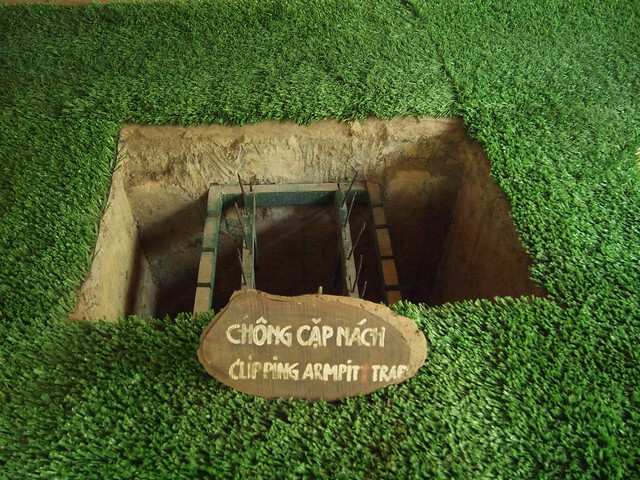
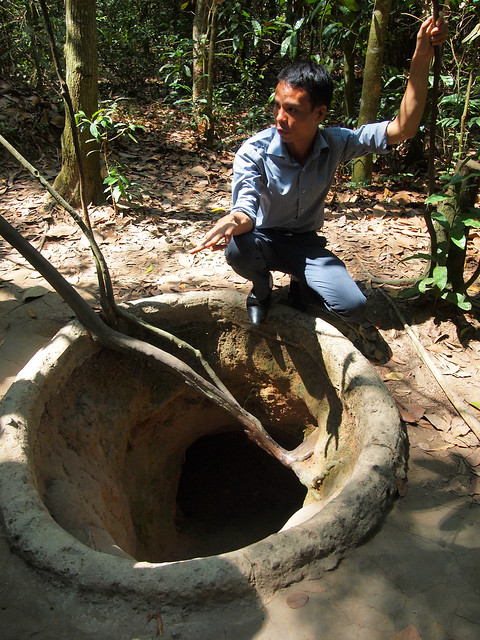
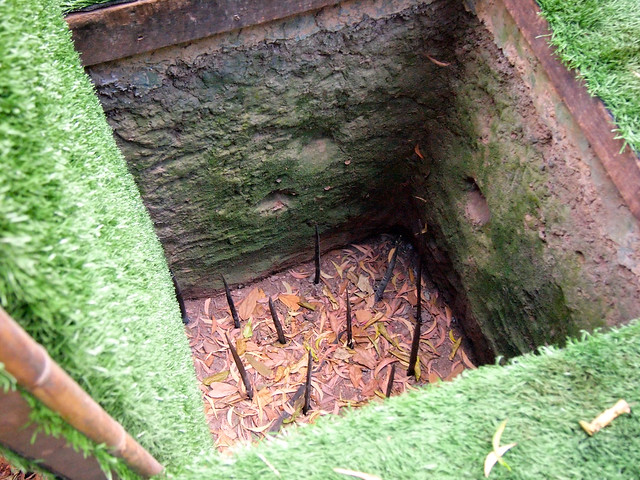
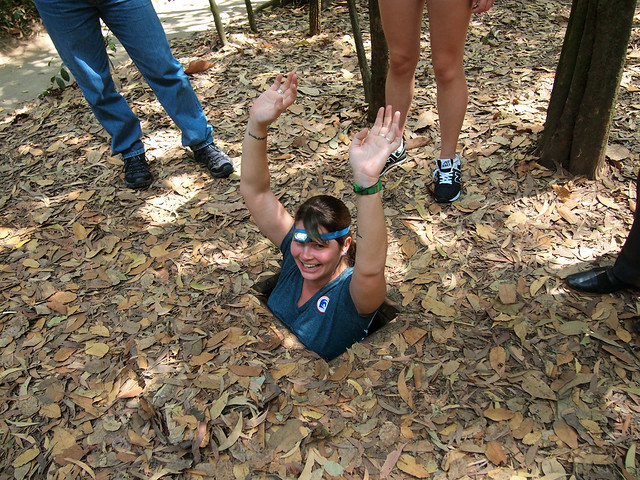
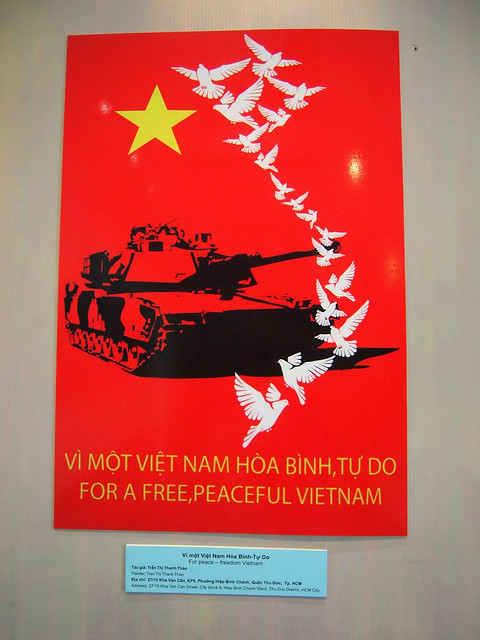
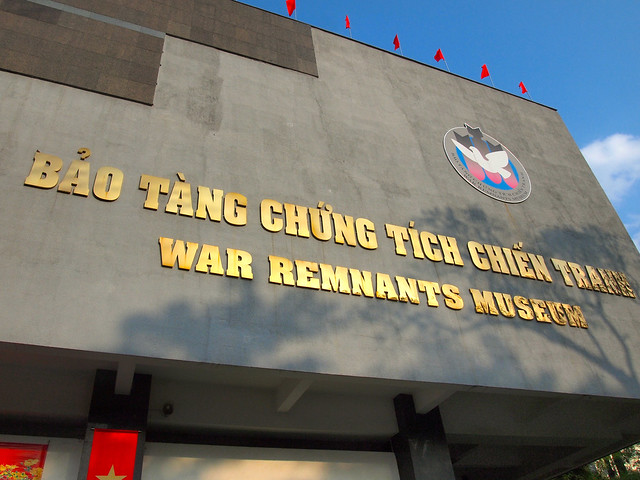
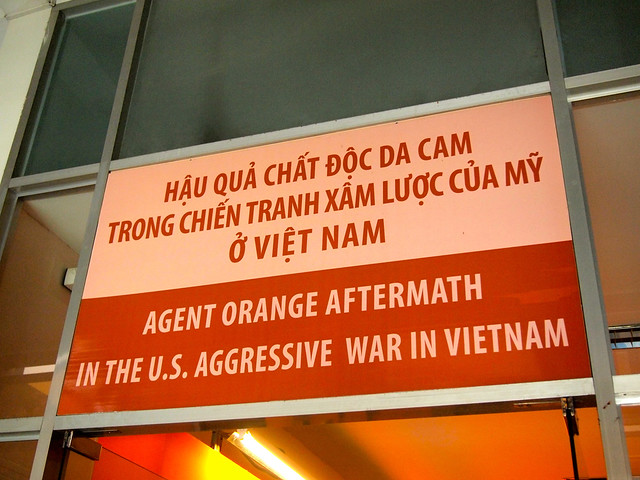
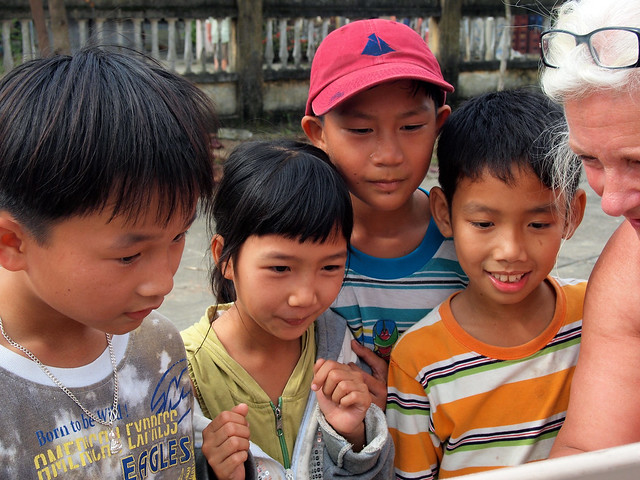
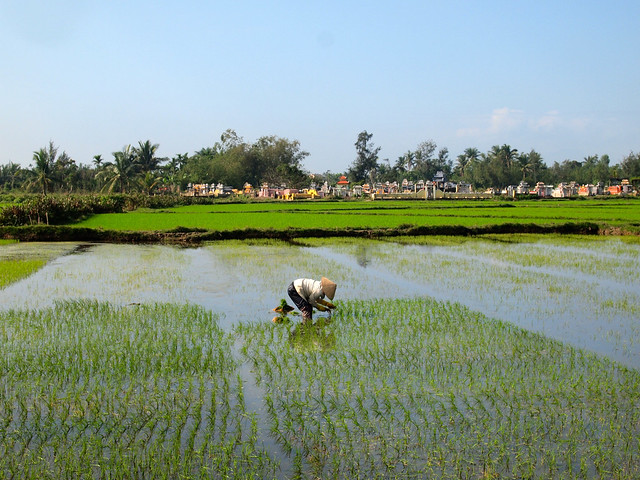









I spent a lot of time in Vietnam. They really hate Americans and rightfully so due to US invasion of Vietnam. My Russian fellows from KGB did a great job assisting VC and as such, Russians are loved by the Vietnamese. At first they are apprehensive of me as they assume that I could be an imperialist American, but after they find out that I was born in Russia, VC become very friendly and we laugh about all the cool booby traps they designed for ignorant American rapists and murderers. But seriously, US asked for it and I don’t blame the Vietnamese being “biased” or whatever. I am surprised they even let US Citizens into Vietnam after what they did there. Be grateful that you are allowed to experience that wonderful country and don’t complain about the way you are treated. What I found in my travels is that, generally, people treat you exactly the way you deserve to be treated.
Actually, I found most Vietnamese people really welcoming to me – even with me being American. People in other parts of the world do a much better job of separating a people from their government. I was not alive during the Vietnam war, so why should I be “punished” for something I had nothing to do with? I agree that it’s horrible what happened in Vietnam, and I’m certainly not proud of that. But I do NOT feel like I deserve to be treated poorly because of what some Americans did decades ago.
[…] his own people, he was very anti-Vietnam. And this was at a time when the U.S. was fighting a war with Vietnam and looking for […]
It’s a shame that the one guide in particular had such a negative attitude towards all Americans, but it’s nice to hear that you were treated so well during the rest of your travels around Vietnam. I think it’s a difficult balance when you find yourself feeling guilty for things committed by your country people in the past, but allowing yourself to learn from these things and be a better global citizen. It sounds like you’re doing a great job with that!
Thanks, Laura! Overall, I rarely felt uncomfortable in Vietnam. But I knew it was worth writing about the one time that I did!
Very interesting and inspiring post – you were my inspiration for this one http://www.thetravelanimal.co.uk/index.php/war-sites-in-vietnam/
Glad I inspired you to write about your own experience!
[…] An American in Vietnam […]
I chose not to visit either of those sites (though we did hit up the Reunification Palace). I also did visit some other sites around Hanoi with Vietnamese couchsurfers, and there were a couple awkward moments as I was also with a French girl – who of course was ashamed of what her country had done, even if she had nothing to do with it personally.
I’m not going to pretend I know very much about the Vietnam war. My observation as an outsider is that I can understand how upsetting this must be for American visitors (simply putting myself into your shoes, I certainly would be upset, embarrassed, angry). But I am a bit baffled when they are *surprised* after visiting these sites. I wonder what they expected?
I also do wonder what it is like for those guides to have to see these things and relive this part of history over and over again everyday. That can’t be good for their health and happiness.
It’s certainly an upsetting topic for both sides, and not an easy topic to address – I wasn’t even sure I was going to write this post for quite a while!
I have to say I enjoyed this post a lot. I haven’t been to Vietnam yet, but my uncle served over there. He is still suffering from PTSD and the effects of Agent Orange exposure. He doesn’t talk about his service in the Army. Ever. I’ve learned to never ask about it.
In my many travels though, I have visited some sites of remembrance, the most compelling was ground zero in Nagasaki. Wow. Absolutely incredible. I still don’t know how to put into words my feelings and thoughts from my visit almost 4 years ago. I came away from that experience feeling more educated, yet feeling a deep sense of regret over what my government did. On that same trip, I also visited several places sharing the history of the Hidden Christians in Japan. Some of the atrocities committed were on par with other acts of war…and these were against their own people!
Out of all the traveling I have done, there is one thing that holds true…each country has its own “skeletons in its closet” and there is not a place I have been to that is completely innocent or has not taken human life unnecessarily.
It is important to visit these sites. Perhaps we will learn one day and “Never Again” can be a possibility. I appreciated your reflection.
I definitely agree with you that every country has those “skeletons in the closet.” It’s so true. No country or government is innocent, and it’s definitely important to remember that.
And I also agree that, no matter how uncomfortable they make us, places like this are definitely important for us to visit. And, as someone with a blog and an audience, I feel obligated to also write about these places!
I had a similar experience in Sarajevo with a guide telling the tour bus that it was America’s fault for not stopping the bombings- and he said a couple mean remarks about Americans knowing my friend and I were. But the city as a whole, everyone was really nice. I can imagine tour guides who talk about war every day are a little jaded.
Yes, you are right, I’m sure. That, and I think after a while it would be difficult to not let your personal opinions seep into your guiding.
I had to cut my trip to Vietnam short, so I didn’t make it down there. But I did go to the Hanoi Hilton, which certainly portrays things differently than we’ve been taught. I never learned as much about the Vietnam War as you did in high school for some reason, but I wish we had. I agree that it was a war we never should’ve gotten involved with, like so many other wars and conflicts our country seems to think they have to jump into. I’m glad you had mostly good experiences with the people you met in Vietnam. Most people throughout the world are pretty good at separating a country’s citizens from its government.
Yes, it’s always quite crazy to me that Americans – who seem to get into more foreign conflicts than anyone else – can’t seem to differentiate between a people and their government. I blame our media, mostly, but I agree that elsewhere in the world people seem to have no problem doing this!
Hi,
I really enjoyed this post. Even as a non-american I felt a similar discomfort when visiting. It is the pride in the actions that people are forced to take that were the most disconcerting. Especially the newsreel celebrating the woman who killed numerous soldiers.
But after a little introspection and a bit more learning I began to understand it. Vietnam is a country that has historically had to defend itself from numerous attacks, it prides itself on its ability to do this and persevere in these circumstances. Once I realised this, I began to accept it for what it is deep down. A celebration of ingenuity and their peoples spirit.
Although I don’t agree with it ( in fact, I still find it quite disconcerting) I accepted it. There is obviously still some deep down animosity towards Americans in some circles and it does spill through but I do think it is as much a celebration of the above as it is finger wagging at the US.
Now, whether I agree with having that message ingrained in the national psyche is a different story.
A very thoughtful comment, Martin, and I understand completely what you mean. I, too, understand why these places are presented that way in the end, but that didn’t stop me from feeling a bit uncomfortable while visiting them. But I think that’s okay. Sometimes being forced to think about things differently – and maybe be a bit uncomfortable – is a good thing, especially when traveling.
I am not American, but reading this post made me angry inside, I think this is what these kind of subjects do. Usually war, religion and politics are not subjects comfortable to aproach and best to be avoided, as it can lead to polemics and even ruining friendships. It’s unfortunate how we all live on the same planet and each and every country makes general statements about the others, many of them based on misinformation and generalisation. Americans should not be judged for what happened in Vietnam, because it was not a national decision, but the decision of the leaders.many, like you, are wise enough to realize that what happened in Vietnam was not a good thing. War is Never a good thing. It’s nice that you went there, is n ice to seek the truth, even though sometimes the thruth differs accordig to the side that presents it 🙂 travelling showed me, as I am sure that you noticed too, that one of the most uncomfortable things when meeting foreigners is prejudice, either towards me, or the prejudice I have towards them, often not justified, of course. But also travelling has taught me that we are all humans, individuals, and a country should not be judged for some bad leaders making wrong decisions, or because some people ruined the reputation of their country. I like that you tried to write the article in a impartial manner, trying to state facts without being totally dragged into personal emotions, and you write good, I am a big fan of yours 🙂 I actually checked your site today to relax, I didn’t think I will find such a “heavy” topic 😀
Well come back tomorrow for a much lighter post, Corina! 😉
I’m glad you stayed to read the post, even if it wasn’t what you were expecting to find. And thanks for your thoughtful comment. A Mark Twain quote comes to mind in regards to what you wrote: “Travel is fatal to prejudice, bigotry, and narrow-mindedness.” I fully agree with that; travel has certainly opened my eyes to how similar we all are, no matter where we come from or what religion we practice.
Oh, yes I remember that quote, it’s a good one, and true! 🙂
I honestly don’t know how your guide wouldn’t be ‘biased’. He’s from a country that got bombed into a living hell by America, – a country that was involved in a war it should never have been involved in – and instead of fighting a ‘ground war’ on the same terms as the Vietnamese, America fought a ‘coward’s war’ by dropping literally millions of tons of chemicals and bombs mostly on innocent civilians – rice farmers, buffalo herders, men, women and children living in tiny, secluded villages in the middle of the jungle who were doing nothing but trying to live their lives, and then 40 years later Americans have the audacity to say ‘our guide was biased’ or the museums made Americans seem like monsters?
The American army WERE monsters. The massacres, the rapes, the pillaging, the murders of tens of thousands of children and on and on and on.
The Vietnam War, or the American War as the Vietnamese call it, was one of the most brutal examples of atrocities the world has ever seen, and that it was whitewashed in the American news media does not, in this day and age, excuse any American from looking for the real truth of what the US military did.
And, if you think the US has changed, try talking to just about anyone in Iraq or Afghanistan, where the US has continued to perpetrate its atrocities on a huge percentage of their populations.
I spent 22 years living in the US and was thankful to leave when I finally did, as it’s this attitude so many Americans have to what their country does in their name that simply makes me ill.
It’s unfair to call all American soldiers monsters, whether in the Vietnam war or others. Soliders from other countries have done equally terrible things in times of war. I am NOT defending the Vietnam War. I, too, think it was a huge mistake. Just as I think it is a mistake for us to currently be involved in the Middle East. But that has nothing to do with this post or discussion…
I’m not trying to whitewash anything. But I’m also not attempting to vilify any one side. I’m simply presenting my personal experience and trying to make sense of it through writing. Shouldn’t that be a good thing?
What an incredible post! I really applaud you for touching on some topics that are deemed controversial. I couldn’t have agreed more with everything you wrote.
Thanks, Andi. It’s by no means a perfect post, but I feel like it reflects my experience, so I’m happy with it!
I think you are very thoughtful, but defensive and unrealistic. However, if I can make you feel better with some facts:
. These government-run propaganda tourist sites are very small parts of thousands of attraction establishments featuring long Vietnam history (4,000 years) and designed for Vietnamese and non-Vietnamese alike. Roughly 66% of Vietnamese are under 40 years old, born after the war ended and 75% of visitors are Vietnamese citizens. They had to be reminded of what and how they lost 2 millions people in the war, pushed back 30 years of development and still suffer residual effects today. These museums are, of course 1 sided and represent the official view only.
. In Hanoi, they have a war museum called ” International Friendship and Solidarity” where they feature documents, dates of milestones, souvenirs and pictures of numerous anti-war events, war support of friendly nations throughout the world. Prominent anti-war Americans are often invited to Vietnam for significant anniversaries and the 4 Kent State students were named. Several Vietnamese books about the war by senior North and South politicians attributed drafted soldiers, former GI’s and anti-war movement in the US amongst others as contributors to their victory.
. Despite supposedly more free and open society in the US vs. more state directed information availability in Vietnam, when compared to American, Vietnamese are able to separate American government acts and American people more readily and their lack of resentment for the US past atrocities either prove 1) Propaganda don’t always work or American propaganda are more affective. 2) Vietnamese have more tolerance capacity than their American counterpart.
My aim was not to come off as defensive. But, it’s also worth noting that this post is ONLY talking about those two propaganda-heavy sites that I visited, and my personal experience there as an American. I do agree that these sites are probably geared more towards Vietnamese visitors and of course they only show the “official” state-sponsored view. But the fact is that people other than Vietnamese visit these places, too. This was just my experience with them.
No need to make me feel better, however, because I don’t believe there’s anything for me to feel bad about with this post. 🙂
What Kenin says is true, and it took a lot of research, misunderstanding and annoying question asking for me to even be able to answer that question or wrap my head around the scope of the entire war. In a sentence, the Americans got involved to prevent the spread of communism.
I spent three weeks in Vietnam altogether and I used my time there as a history lesson. I spoke to people, did research, visited the war memorials, and I learned an unbelievable amount about Vietnam and its people, as well as my own country. Perspective is very important, and it’s something that many people lose when they travel.
I found the Vietnamese to be resilient and beautifully underspoken people. As for visiting Vietnam, the war should not be a detracting factor. Instead, I’d like to see people use it as a platform to learn and move forward and to understand their role within the rest of the world.
I agree that perspective makes such a difference, and it’s great that you used your time in Vietnam as a big history lesson.
I came to the same conclusions as you about Vietnam and it’s people – it’s all beautiful. And you’re right that the war should not be a detracting factor at all to visiting. I’m so glad I went.